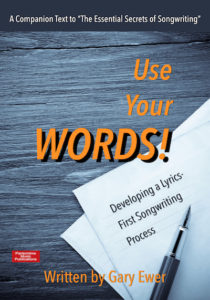If you want success in writing music, you need to be able to listen to your own music objectively, and to be able to judge it objectively. I’ve written a lot on this blog about how to do that (here’s one article, for example: How Objective Listening Improves Your Songwriting).
To listen objectively ends up being this: are you able to listen to your own songs as if someone else wrote them? If you can do that, you’ve detached yourself enough such that you’re able to judge your music fairly without hurting your own feelings.
 Are you ready to have LYRICS take a much more important role in your songwriting process. You need to read “Use Your Words! Developing a Lyrics-First Songwriting Process.” Right now, it’s FREE with your purchase of “The Essential Secrets of Songwriting 10-eBook Bundle.”
Are you ready to have LYRICS take a much more important role in your songwriting process. You need to read “Use Your Words! Developing a Lyrics-First Songwriting Process.” Right now, it’s FREE with your purchase of “The Essential Secrets of Songwriting 10-eBook Bundle.”
And once you’ve become an objective listener of your own songs, you can deal with the issues that are truly getting in the way of them being great songs.
Musical Boredom
A song that’s boring to listen to could be one of the most common issues in the songwriting world. The good news is that when songs don’t pop, the cause is usually identifiable with a bit of objective listening, and the fix is often not very difficult.
Because every song is different, the cause of musical boredom could be almost anything. But in my experience, here are the top 5 reasons why songs, once you’ve written them, fail to make an impact on audiences:
- The lyrics aren’t making enough of an emotional connection. Lyrics need to touch the heart of the listener with some emotion, whether that’s joy, excitement, sadness, melancholy, humour…
- There’s not enough difference in the range of the chorus and verse melodies. This may not be a problem, but if you’re hoping for your chorus to really POP and it doesn’t, it may mean that your verse is pitched too high, and upstaging the chorus.
- The song is too long. Whether it’s too many verses, an instrumental solo that goes on too long, an intro that’s too long, or some other reason, songs almost never suffer from being too short. They will, however, suffer from being too long.
- The chorus doesn’t have anything hooky about it. Most song choruses need to have something that really pulls the audience in, something exciting to keep people humming it long after they’ve heard it.
- The topic isn’t universal. Song topics don’t need to be profound — they do need to be universal. You should be singing about something that has the ability to generate an emotional response in the listener. If you can’t picture holding someone’s attention while talking to them about your topic, don’t expect that things will change simply because you’re singing about it!
 Written by Gary Ewer. Follow Gary on Twitter
Written by Gary Ewer. Follow Gary on Twitter
 Thousands of songwriters are using “The Essential Secrets of Songwriting” eBook bundle to polish their songwriting technique. Every aspect of how to make a song better is covered. Stop wasting time — take your songwriting technique to a new level TODAY. Ten eBooks, plus a free one: $37 USD (Immediate download).
Thousands of songwriters are using “The Essential Secrets of Songwriting” eBook bundle to polish their songwriting technique. Every aspect of how to make a song better is covered. Stop wasting time — take your songwriting technique to a new level TODAY. Ten eBooks, plus a free one: $37 USD (Immediate download).










